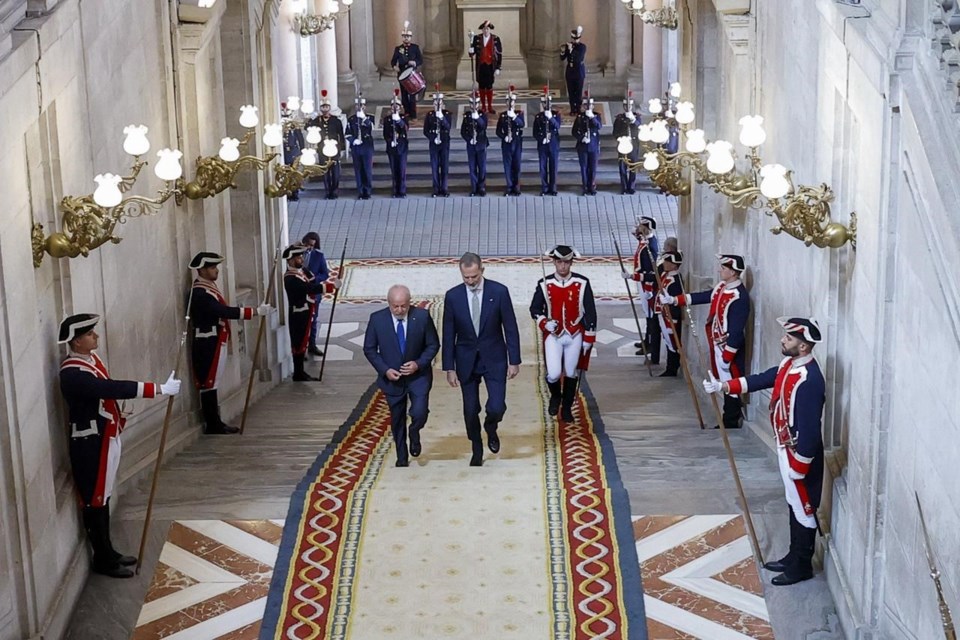MADRID (AP) — Brazilian President Luiz Inácio Lula da Silva met with Spain's prime minister Wednesday for talks aimed at making progress on an intercontinental trade deal, but his differences with the European Union on the war in Ukraine remained evident.
The 27-member EU completed negotiations in 2019 on a wide-ranging trade deal with Mercosur, a South American bloc that includes Argentina, Brazil, Paraguay and Uruguay. But ratification stalled during the presidency of Lula's predecessor, Jair Bolsonaro, due to concerns over environmental standards and price protections for European farmers.
Lula and Spanish Prime Minister Pedro Sánchez held a news conference after signing bilateral agreements Wednesday. The warmth between the two left-wing leaders was evident, but their divergent views on Ukraine left a note of tension in the room.
“There is no doubt that we condemn Russia's violation of Ukraine’s rights with the invasion, but it is of no use to say who is right or wrong. The war must be stopped,” Lula said.
He drew a comparison between Russia's actions in Ukraine and wars waged by other permanent members of the U.N. Security Council, invoking the United States' invasion of Iraq in 2003 without a United Nations mandate.
Earlier this month, Lula irked Western leaders when he said that both Ukraine and Russia had decided to go to war and that U.S. military aid was fueling the conflict.
In Spain, Lula reiterated his call for a “G-20 of peace,” which he envisions as a group of nominally neutral nations that would try to mediate an end to the Ukraine conflict. The U.N. Security Council's permanent members “are the ones who sell the most weapons in the world," the Brazilian president said, suggesting that countries like Brazil, Egypt or South Africa were better positioned to mediate.
Earlier in his visit, Lula said that peace must be restored in Ukraine because of the war's knock-on effects on global food and fertilizer prices.
He later reassured his Madrid audience of Brazil's commitment to international cooperation, reeling off a list of world leaders he had met with since he began his third non-consecutive term at the beginning of the year, and stating his intention to meet many more.
“Brazil is back,” he said.
Sánchez trod a fine line on Ukraine, thanking Lula for his peace proposal but telling the Brazilian leader that “in this war, there is an aggressor and a victim, and the aggressor is Putin.”
The Spanish prime minister added: “If we want a fair and long-lasting peace, it is fundamental that the voice ... of Ukraine and its president be heard.”
Separately, Brazil and Spain are pushing to get the fine print of the Mercosur deal ready for scrutiny by member nations at a joint July 17-18 summit of the EU and the Community of Latin American and Caribbean States (CELAC).
Spain takes over the EU’s rotating presidency in July, and Brazil will simultaneously assume the equivalent role in Mercosur.
Sánchez described the CELAC meeting as an “excellent opportunity” to push the treaty forward, while Lula added: “we need to get it done.”
The Mercosur-EU agreement would integrate a market of around 800 million people that represents about one-forth of the world’s gross domestic product and more than $100 billion in bilateral trade of goods and services. The deal would cut customs duties and ease access for agricultural exporters to the EU market, and for European manufacturers to Mercosur countries.
Mario Sergio Lima, a senior political analyst for Brazil at Medley Global Advisors, said Lula's Ukraine comments were “not helping” the deal's progress.
“I don’t think that this is what will determine the relationship with Europe, but it is something that rather complicates the conversations," he told The Associated Press. "It’s reversible, but Brazil should try to distance itself as much as possible from the Russia issue.”
Following meetings with Spanish business leaders on Wednesday, Lula also made sure to promote his longstanding links with the country's trade unions, and tweeted a photo with a delegation from the main UGT union.
He was hosted by Spain's King Felipe VI for a lunch at the royal palace and was due to return to Brazil on Wednesday afternoon.
—-
Martins reported from Sao Paulo
Jennifer O'mahony And Laís Martins, The Associated Press




